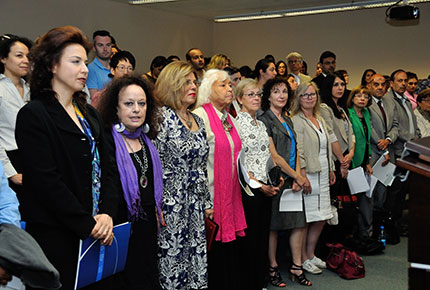Women’s rights in times of war
In collaboration with local, regional and international partners, IWSAW hosts major conference focusing on women’s issues in the Middle East.
Approximately 100 people sat in suspense in the auditorium of LAU’s Adnan Kassar School of Business, listening intently to acclaimed Egyptian author and activist Nawal El-Saadawi. “We cannot liberate ourselves unless we promote ourselves and unveil our minds,” she said to the audience. “We need to be better organized in order to move on and start liberating ourselves.”
Her impassioned keynote address was an energizing start to LAU’s four-day conference focusing on contemporary women’s’ issues in the Middle East. The conference, titled “Upholding Gendered Peace at a Time of War,” launched in June as the result of collaboration between LAU’s Institute for Women’s Studies in the Arab World (IWSAW) and several other organizations bringing together academics and activists from around the region and the globe.
IWSAW’s partner organizations included Women in War (France), Beit Al-Hanane (Lebanon), the Konrad Adenauer Stiftung (Germany), The Danish Centre for Research and Information on Gender, Equality and Diversity (KVINFO Denmark), and the Organisation internationale de la Francophonie (France).
Throughout the conference El-Saadawi’s concept of organization and action were themes that arose again and again. “I’m hoping that people meet each other, network, build, grow and establish something,” said LAU Vice President Elise Salem as she introduced the conference at the opening ceremony.
With multiple conflicts transforming the Middle East, the topic at hand is of particularly timely importance, according to IWSAW Director Samira Aghacy. “We felt that this was the right moment to host this conference at a time of vast and rapid changes taking place in the region, the ongoing wars in Syria, Iraq, Yemen, Libya, Kurdistan, all of which have disrupted the position of women in the region and destabilized stereotypes.”
According to Hana Nasser, administrative director at the Konrad Adenauer Foundation, “In effect the world is still witnessing that up to half of the population of the world is not enjoying rights due to gender.”
Evelyne Accad, co-director of Beit el-Hanane, reiterated the conference’s relevance in her opening statement. “In these very difficult moments that we are passing through, the whole region being in such upheaval and war and more violence and where women and children and old people are paying such a high price, it is so good to see that we want to make some change.”
Myriam Sfeir, assistant director of the IWSAW who played a central role in organizing the event, noted that the conference was also significant because “women and men suffer differently in times of war and gender specific differences prevail.”
The conference’s packed schedule arranged for over 60 speakers to present at the Crowne Plaza Hotel throughout the week. Each day was organized into three panels, which were categorized by topics and themes explored in interesting and sometimes unexpected angles.
While guests and participants were optimistic about the changing state of gender norms in the region, the conference also served as a reminder of the challenges that remain unresolved. One key recommendation that came out was the importance of establishing a women’s network that seeks to shed light on the current developments in gender rights and calls for networking with other national and international women’s rights groups.
More
Latest Stories
- Fostering a Culture of Research Collaboration and Impact
- Beneath the Smile: Dr. Omar Itani Reveals the Hidden Cost of Emotional Labor in Sales
- SOE Launches its Distinguished Scholar Visiting Program with International Guest Dr. Feras Batarseh
- LAU Nursing Camp Opens Eyes, Hearts and Futures
- Meet Dr. Zeina Khouri-Stevens, Executive Vice President for Health Services
- LAU Family Medicine Graduates to Benefit from a Partnership With Nova Scotia
- AKSOB Assistant Professor Shares Her Vision for the Future of Learning
- LAU Simulation Models Celebrate 20 Years of Learning, Leadership and Service


